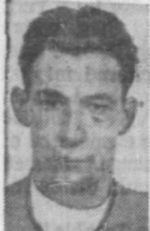 Chicago Tribune, June 14, 1958
In the early hours of April 9, 1942, an intruder entered a Chicago apartment and raped a 20-year-old pregnant woman while her toddler slept nearby. There were no signs of forced entry, so police determined the rapist likely used a key to enter the apartment. The spare key to the apartment had been given to the victim’s friend, 18-year-old Maxine Miller, who told police she had lost the key while out at a bar the previous night. Miller said she had visited a tavern about a half mile from the victim’s apartment and spoken with an Army officer for much of the night there.
The so-called Army officer from the bar was identified as 28-year-old George Bray. Earlier in 1942, Bray was a member of the Illinois National Guard, and he was given a physical examination in preparation for his induction into the U.S. Army for active war duty. The doctor discovered Bray had a perforated eardrum that disqualified him from service. Nonetheless, wanting to appear that he was an Army aviator, Bray wore his Army uniform when he went out to a bar on April 8. According to Bray, he spent several hours talking with Miller then left alone and headed home on the train around 2:00 a.m.. He said he knew nothing about the lost key or the rape.
Police arrested Bray on a charge of impersonating an officer and placed him in a lineup to be viewed by the rape victim. Bray pled guilty to a federal charge of impersonating an officer and received a six-month prison sentence. While in prison, Bray learned that the victim had identified him in the lineup and that he would be prosecuted on state rape charges after his release from federal prison.
Bray insisted he was innocent and said he had been riding home on the train at the time of the attack. He told police that his train home that night had been a two-car train. Police told him only single-car trains ran at night and dismissed his story.
Bray’s bench trial took place in November 1942 in Cook County Criminal Court before Chief Justice John A. Sbarbaro. Bray’s appointed attorney was ill the day of his trial, and a young attorney replaced him just minutes before the trial began. The victim identified Bray in the courtroom. Miller identified Bray as the man from the bar and testified that he had carried her coat for her when the key to the victim’s apartment was in the pocket. Bray’s attorney did not offer evidence to support his claim that he was on the train at the time of the attack. Available records do not indicate whether Bray testified. Bray was convicted and sentenced to 99 years in prison on November 24, 1942. He fainted when his sentence was read.
Ten years later, in 1952, Bray’s mother, who was ill with cancer and convinced of her son’s innocence, persuaded Chicago attorney Joseph R. Lee to take on Bray’s case. She died soon after, but Lee became committed to Bray’s case.
Working pro bono, Lee began reinvestigating the case and eventually he tracked down the victim, who had since moved to Miami, Florida, and changed her last name. When speaking to Lee, the victim told him she had not identified Bray in the lineup. She said she had later identified him only because police assured her that he was the man who assaulted her. She refused to sign an affidavit due to her concerns of subjecting herself to perjury charges.
Lee spoke with a train clerk who tracked down the train ledger from the night of the crime. The ledger confirmed that one two-car train had been running the night of the crime because one of the usual single cars was under repair. Lee also spoke with Chicago Detective Frank Cassidy, who was present for the lineup in which the victim failed to identify Bray. Until talking with Lee, Cassidy was unaware that this information about the lineup had not been introduced at Bray’s trial. Cassidy then contacted the victim, and he would later testify that the victim offered him a bribe to keep him from testifying about her initial failure to identify Bray.
Based on this new evidence and the failure of Bray’s trial attorney to subpoena the train records to support his alibi, Lee filed a motion for a new trial. On June 4, 1958, the new evidence was presented at a hearing before Judge Sbarbaro. He granted Bray’s request for a new trial, saying that Bray’s case was one that had always bothered him.
On June 13, 1958, assistant state’s attorney Lawrence Genesen told Cook County Superior Court Judge Grover C. Niemeyer that there was not enough evidence against Bray to retry his case. Niemeyer dismissed the charge against Bray, and Bray was released from prison after 15 years.
- Meghan Barrett Cousino |